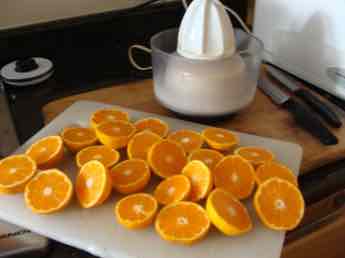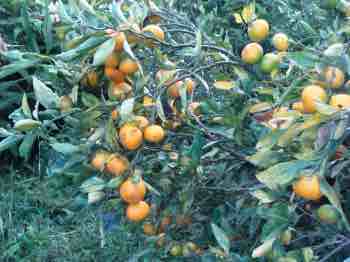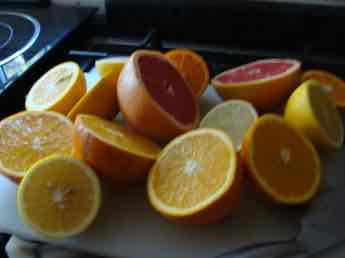- Bernard Preston homepage
- Citrus
- Calories in Orange Juice
Calories in orange juice
The calories in orange juice may be of little interest to you if you do hard physical work or are a professional sportsman; you will burn them off in no time.
But if you like me spend a good few hours every day at a computer, or behind the wheel of a motor-car then we need to be mindful of the energy content of our drinks.
This page was updated on 9th January, 2024.

It is never a bad thing to test whether your beer is the master of the house or the nave; periodically a glass of freshly-squeezed orange juice is every bit as much evidence that God loves us and wants us to be happy.
It is easier to keep the pounds off than to struggle to remove them
after the fact. Mind you, considering the proliferation of colas and
energy drinks on the market you probably really do not need to be
anxious about your orange-juice; citrus is a gem.
A glass of water at your side is one way to make sure you get plenty of fluid without too many calories from your tea, orange-juice or beer.
Also be conscious of the fact that refined OJ out of a carton has substantially more calories and less nutrients than freshly-squeezed orange juice.
For example it has one-third of the vitamin C.
That is very significant if you are having any sort of cartilage issues
like a slipped disc or knee pain.
All orange-juice and particularly that with a reddish hue has a significant amount of the betaines; they have an important function in the methylation of toxic homocysteine in the body. It is a breakdown product of protein metabolism.
There are also significant amounts of choline, a betaine-precursor particularly again in reddish orange juice and especially the mandarins.
Calories in Orange Juice
Whilst the nutrients in a glass of freshly-squeezed orange juice are of the highest calibre, the calories are reasonably high.
There are 10g of carbohydrate in a glass of orange juice; about 80 percent of which are simple sugars. That makes for 45 calories or 191 kilojoules of energy which you could burn off in about 12 minutes of brisk walking; in short, not a lot.
A can of Fanta contains 160 calories; nearly four times as much.
As a rule of thumb, multiply the calories by 4 to get the kilojoule equivalent.
An average can of beer contains about 150 cals, by the way just for comparison; roughly 600 kilojoules. That is a lot and where I have to be careful. In fact as a result of all this testing I gave up my ale and turned to brewing mead; alas that's only for beekeepers.
Obviously this needs to be considered in the context of your whole menu-plan if you are diabetic or seriously overweight. You can always dilute it by half with drinking water.
It is the great taste that I love in orange juice. The vitamin C, bioflavonoids and folate for example are just a side-benefit; and all the other ingredients. It really is a medicine chest.
Or as I often do add half a freshly-squeezed orange to a large mug of weak iced tea.
Read more about "drinking water" by using the Site Search function in the main menu above.

There are numerous food plans doing the rounds that severely limit carbohydrate; that would include an orange in any form. Whilst I think modified banting for example has much merit, recognise that you are not only cutting down on calories; vital nutrients are being excluded too.
It makes no sense to lose weight but deprive yourself of nutrients in the process. The average Western diet has less than fifty percent of the recommended choline[2] for example; orange juice is a moderately good source.
 A profusion of mandarin oranges
A profusion of mandarin orangesIt is the balance of the whole meal that counts; the refined carbs like donuts, white rice and cookies are what really do the damage. In short those starches with high glycemic indices that induce an insulin surge; that is the fat-storage hormone.
Are you convinced? Then think about planting a mandarin orange tree or a lemon in your garden; better still, both.
They are loaded with bioflavonoids, those so-called functional foods that help prevent disease and promote wellness.
Glycemic index
Quite apart from the calories in orange juice, how does the glycemic index of the whole fruit shape up?
- The GI of a whole orange is 40; which is very low.
- Freshly-squeezed and unstrained it is around 45.
- Unsweetened commercial orange juice in a carton is 50 to 55.
- Fanta is 68; very high.
All the natural juices in fact are 55 or less and so can be called low GI.
The glycemic index is a measure of how quickly carbohydrates release their sugars into the blood stream. High GI foods are fattening and stress the pancreas leading to type II diabetes; they make us obese.
All forms of unsweetened orange juice have a low GI but the carbs remain significant; we do need to be concerned if we are inactive. Do you have a desk job?
Read the label; is there added sugar, corn syrup or fructose?
Greater consumption of orange juice has been criticized because of its high intrinsic sugar level, being associated with a higher risk of type 2 diabetes and cardiovascular diseases.
I personally may be on the verge of being pre-diabetic, hence my interest. Today I pricked my finger four times after a glass of one juiced orange plus half a grapefruit both with all the pulp; followed by Egg Florentine on a slice of toast made from 100 percent wholemeal bread.
There was no significant exercise after the meal. The results are of interest:
Time min
BG
0
4.7 (85)
30
6.9 (125)
60
5.2 (95)
120
5.4 (98)
This is an entirely normal result.
However and this is important, the following day I ate exactly the same breakfast but with an hour's break before the egg; my glucose shot up to 9.2 (165) at 60 minutes. That is high.
In short this is a complex subject and if you are obese or even pre-diabetic as I am, it behooves you to get a glucometer and start testing yourself; what foods and combinations provoke the high blood sugar that unquestionably will harm our bodies?
Better still today is to get a Continuous Glucose Monitor that will send blue-tooth readings every few minutes to your cellphone[3]. They are quite expensive; one month is recommended.
High blood glucose also causes inflammation of the cholesterol that may be lining your blood vessels.
That is assuming you want to reach a vital and strong eighty-years old; I am aiming for ninety so the calories in orange juice are important to me. I will only enjoy it with a meal; as a snack it produces a highly glycemic reaction and could knock decades off my life if I drink it regularly.
Test yourself before accepting that freshly-squeezed, unfiltered orange juice is fattening and will contribute to a higher risk of diabetes. I now have half the amount diluted with water and always with a meal and take some form of exercise; usually a short, brisk walk after breakfast. You could react quite differently.
OJ from a carton remains highly questionable; I am not inclined to test myself but you may.
Food as medicine
Food as medicine is not new; it was the keystone of Hippocrates' care but it has been rediscovered in the context of diabetes. Scientists have found that those suffering from T2D can be brought completely into remission without the use of drugs.
Though not vegetarian it is done through a return to a plant-based diet and exercise after starchy meals. There's plenty of fibre in oranges but not in the juice.
Stunting and fruit juice
Researchers reporting in the journal Pediatrics report that excessive fruit juice consumption is associated with failure to thrive in young children. 53 percent of those drinking more than 12 fl oz/ day (355 ml) were obese and 42% had low stature[1]; the effect on mental acuity was not measured.
Just as often stunting of children comes from highly refined carbs from which the nutrients have been extracted.
“Many people today do not want honest answers insofar as it means unpleasant or disturbing thoughts. They want a soft reply that turns away anxiety.”
Louis Kronenberger
Bioflavonoids
Bioflavonoids and vitamin C are what make citrus so special, apart from the taste of course; that is indifferent to the calories in orange juice.
Have you any idea why British sailors were called limeys?
The nutrition in limes of course is the answer; those sailors were not concerned about the calories in orange juice. It was the vitamin C that supposedly saved their lives.
But more likely orange juice bioflavonoids played a huge part too; one of them called beta cryptoxanthin has proven anti-dementia properties. If you don't want to lose your marbles long before your time, eat more citrus.
Okay perhaps I should have written lime juice bioflavonoids. They are in all citrus.
Whether it is a mandarin orange tree that you want or growing lemons all citrus is rich in vitamin C and bioflavonoids. Each has its own unique benefits.
Choice foods

Choice foods must surely include all forms of freshly-pressed citrus that uses the pulp; that's where more than half of the goodness is to be found.
OJ in my humble opinion is a fattening junk food, though the researchers seem to agree that even the processed calories in orange juice are not excessively fattening owing to the moderate glycemic index.
But all forms of citrus certainly contribute to the net carbs.
The "Modified Banting diet" does have some merits; find it using Site Search above.
Useful links
- Orange juice facts home page.
When browsing use right click and "Open Link in New Tab" or you may get a bad gateway signal.
Newsletter
Our newsletter is entitled "create a cyan zone" at your home, preserving both yourself and Mother Earth for future generations; and the family too, of course. We promise not to spam you with daily emails promoting various products. You may get an occasional nudge to buy one of my books.
Here are the back issues.
- Lifestyle and ideal body weight
- What are ultra-processed foods?
- Investing in long-term health
- Diseases from plastic exposure
- Intensive lifestyle management for obesity has limited value
- A world largely devoid of Parkinson's Disease
- The impact of friendly bacteria in the tum on the prevention of cancer
- There's a hole in the bucket
- Everyone is talking about weight loss drugs
- Pull the sweet tooth
- If you suffer from heartburn plant a susu
- Refined maize meal and stunting
- Should agriculture and industry get priority for water and electricity?
- Nature is calling
- Mill your own flour
- Bake your own sourdough bread
- Microplastics from our water
- Alternative types of water storage
- Wear your clothes out
- Comfort foods
- Create a bee-friendly environment
- Go to bed slightly hungry
- Keep bees
- Blue zone folk are religious
- Reduce plastic waste
- Family is important
- What can go in compost?
- Grow broad beans for longevity
- Harvest and store sunshine
- Blue zone exercise
- Harvest and store your rainwater
- Create a cyan zone at your home
Did you find this page interesting? How about forwarding it to a friendly book or food junkie? Better still, a social media tick would help.
- Bernard Preston homepage
- Citrus
- Calories in Orange Juice
Address:
56 Groenekloof Rd,
Hilton, KZN
South Africa
Website:
https://www.bernard-preston.com